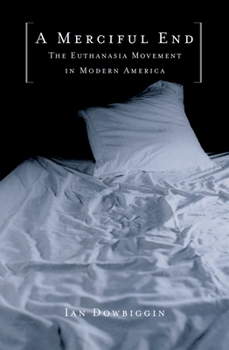A Merciful End: The Euthanasia Movement in Modern America
Select Format
Select Condition 
Book Overview
While it may seem that debates over euthanasia began with Jack Kervorkian, the practice of mercy killing extends back to Ancient Greece and beyond. In America, the debate has raged for well over a century.
Now, in A Merciful End, Ian Dowbiggin offers the first full-scale historical account of one of the most controversial reform movements in America. Drawing on unprecedented access to the archives of the Euthanasia Society of America, interviews with important figures in the movement today, and flashpoint cases such as the tragic fate of Karen Ann Quinlan, Dowbiggin tells the dramatic story of the men and women who struggled throughout the twentieth century to change the nation's attitude--and its laws--regarding mercy killing. In tracing the history of the euthanasia movement, he documents its intersection with other progressive social causes: women's suffrage, birth control, abortion rights, as well as its uneasy pre-WWII alliance with eugenics. Such links brought euthanasia activists into fierce conflict with Judeo-Christian institutions who worried that "the right to die" might become a "duty to die." Indeed, Dowbiggin argues that by joining a sometimes overzealous quest to maximize human freedom with a desire to "improve" society, the euthanasia movement has been dogged by the fear that mercy killing could be extended to persons with disabilities, handicapped newborns, unconscious geriatric patients, lifelong criminals, and even the poor. Justified or not, such fears have stalled the movement, as more and more Americans now prefer better end-of-life care than wholesale changes in euthanasia laws.
For anyone trying to decide whether euthanasia offers a humane alternative to prolonged suffering or violates the "sanctity of life," A Merciful End provides fascinating and much-needed historical context.
Now, in A Merciful End, Ian Dowbiggin offers the first full-scale historical account of one of the most controversial reform movements in America. Drawing on unprecedented access to the archives of the Euthanasia Society of America, interviews with important figures in the movement today, and flashpoint cases such as the tragic fate of Karen Ann Quinlan, Dowbiggin tells the dramatic story of the men and women who struggled throughout the twentieth century to change the nation's attitude--and its laws--regarding mercy killing. In tracing the history of the euthanasia movement, he documents its intersection with other progressive social causes: women's suffrage, birth control, abortion rights, as well as its uneasy pre-WWII alliance with eugenics. Such links brought euthanasia activists into fierce conflict with Judeo-Christian institutions who worried that "the right to die" might become a "duty to die." Indeed, Dowbiggin argues that by joining a sometimes overzealous quest to maximize human freedom with a desire to "improve" society, the euthanasia movement has been dogged by the fear that mercy killing could be extended to persons with disabilities, handicapped newborns, unconscious geriatric patients, lifelong criminals, and even the poor. Justified or not, such fears have stalled the movement, as more and more Americans now prefer better end-of-life care than wholesale changes in euthanasia laws.
For anyone trying to decide whether euthanasia offers a humane alternative to prolonged suffering or violates the "sanctity of life," A Merciful End provides fascinating and much-needed historical context.
Format:Hardcover
Language:English
ISBN:0195154436
ISBN13:9780195154436
Release Date:January 2003
Publisher:Oxford University Press
Length:272 Pages
Weight:2.40 lbs.
Dimensions:1.0" x 6.5" x 9.8"
Customer Reviews
1 rating
Top notch research and enlightening study
Published by Thriftbooks.com User , 21 years ago
This book doesn't simply recount a dry record of various episodes of euthanasia but rather addresses the real history of euthanasia through a host of issues (ideological origins, concepts, etc.) that demand our attention when dealing with the subject of euthanasia. The author does an excellent job of maintaining an objective stance for the most part. This isn't intended as an argument for or against but rather how and why euthanasia and similar issues should remain at the top or our priorities. However, for the record, upon learning the ideological origins and history of the euthanasia movement, its direct link to eugenics, its connection with various unscrupulous individuals as founders and instigators, etc., reasonable people will find it very difficult to support euthanasia. In short, the author traces the origins of euthanasia, both ideological as well as geographical and cultural. We find that altough various forms of euthanasia have existed probably since our beginning, in terms of a formal movement or social agenda the modern idea finds its roots firmly planted in the fairly recent history having its earliest beginnings in the Enlightenment (at least with certain individuals during the Enlightenment) but not materializing until Darwin. Just the discussions concerning euthanasia and its connection with Darwinst ideology, natural selection, evolution, and Humanism more than merit anyone's serious attention. The author truly deserves credit for the research involved in writing this book. The bibliography and notes comprise almost a quarter of the books bulk. He takes you all the way to the bedrock principles that drive euthanasia and where they came from with all the proof anybody could want for his conclusions concering euthanasia's history. He is insightful without being biased, complete but brief, factual and detailed while not boring or cumbersome. In my view, the greatest value of this little book lies on two fronts. First, its unsaid and indirect prompting of any rational person to serioulsy question why you would support or not support euthanasia. Second, it forces (or should force) an individual to delve into much deeper philosophical water concerning the existence of God, human life and its value or lack thereof, and the direction we as human beings should take in the future concerning these and other such issues. In short, this book prompts us to think. I can think of no higher compliment to give.





